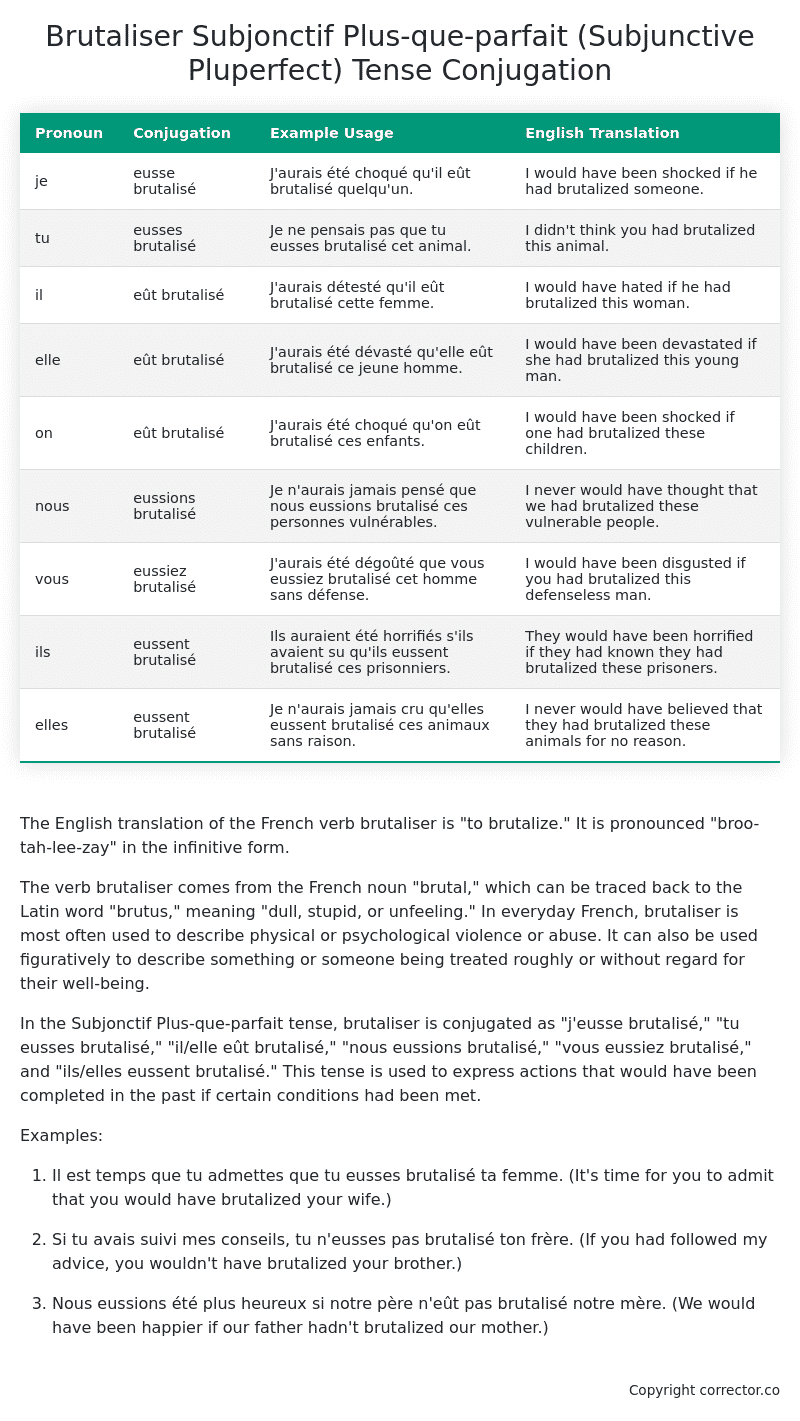Subjonctif Plus-que-parfait (Subjunctive Pluperfect) Tense Conjugation of the French Verb brutaliser
Introduction to the verb brutaliser
The English translation of the French verb brutaliser is “to brutalize.” It is pronounced “broo-tah-lee-zay” in the infinitive form.
The verb brutaliser comes from the French noun “brutal,” which can be traced back to the Latin word “brutus,” meaning “dull, stupid, or unfeeling.” In everyday French, brutaliser is most often used to describe physical or psychological violence or abuse. It can also be used figuratively to describe something or someone being treated roughly or without regard for their well-being.
In the Subjonctif Plus-que-parfait tense, brutaliser is conjugated as “j’eusse brutalisé,” “tu eusses brutalisé,” “il/elle eût brutalisé,” “nous eussions brutalisé,” “vous eussiez brutalisé,” and “ils/elles eussent brutalisé.” This tense is used to express actions that would have been completed in the past if certain conditions had been met.
Examples:
-
Il est temps que tu admettes que tu eusses brutalisé ta femme. (It’s time for you to admit that you would have brutalized your wife.)
-
Si tu avais suivi mes conseils, tu n’eusses pas brutalisé ton frère. (If you had followed my advice, you wouldn’t have brutalized your brother.)
-
Nous eussions été plus heureux si notre père n’eût pas brutalisé notre mère. (We would have been happier if our father hadn’t brutalized our mother.)
Table of the Subjonctif Plus-que-parfait (Subjunctive Pluperfect) Tense Conjugation of brutaliser
| Pronoun | Conjugation | Example Usage | English Translation |
|---|---|---|---|
| je | eusse brutalisé | J’aurais été choqué qu’il eût brutalisé quelqu’un. | I would have been shocked if he had brutalized someone. |
| tu | eusses brutalisé | Je ne pensais pas que tu eusses brutalisé cet animal. | I didn’t think you had brutalized this animal. |
| il | eût brutalisé | J’aurais détesté qu’il eût brutalisé cette femme. | I would have hated if he had brutalized this woman. |
| elle | eût brutalisé | J’aurais été dévasté qu’elle eût brutalisé ce jeune homme. | I would have been devastated if she had brutalized this young man. |
| on | eût brutalisé | J’aurais été choqué qu’on eût brutalisé ces enfants. | I would have been shocked if one had brutalized these children. |
| nous | eussions brutalisé | Je n’aurais jamais pensé que nous eussions brutalisé ces personnes vulnérables. | I never would have thought that we had brutalized these vulnerable people. |
| vous | eussiez brutalisé | J’aurais été dégoûté que vous eussiez brutalisé cet homme sans défense. | I would have been disgusted if you had brutalized this defenseless man. |
| ils | eussent brutalisé | Ils auraient été horrifiés s’ils avaient su qu’ils eussent brutalisé ces prisonniers. | They would have been horrified if they had known they had brutalized these prisoners. |
| elles | eussent brutalisé | Je n’aurais jamais cru qu’elles eussent brutalisé ces animaux sans raison. | I never would have believed that they had brutalized these animals for no reason. |
Other Conjugations for Brutaliser.
Le Present (Present Tense) Conjugation of the French Verb brutaliser
Imparfait (Imperfect) Tense Conjugation of the French Verb brutaliser
Passé Simple (Simple Past) Tense Conjugation of the French Verb brutaliser
Passé Composé (Present Perfect) Tense Conjugation of the French Verb brutaliser
Futur Simple (Simple Future) Tense Conjugation of the French Verb brutaliser
Futur Proche (Near Future) Tense Conjugation of the French Verb brutaliser
Plus-que-parfait (Pluperfect) Tense Conjugation of the French Verb brutaliser
Passé Antérieur (Past Anterior) Tense Conjugation of the French Verb brutaliser
Futur Antérieur (Future Anterior) Tense Conjugation of the French Verb brutaliser
Subjonctif Présent (Subjunctive Present) Tense Conjugation of the French Verb brutaliser
Subjonctif Passé (Subjunctive Past) Tense Conjugation of the French Verb brutaliser
Subjonctif Imparfait (Subjunctive Imperfect) Tense Conjugation of the French Verb brutaliser
Subjonctif Plus-que-parfait (Subjunctive Pluperfect) Tense Conjugation of the French Verb brutaliser
Conditionnel Présent (Conditional Present) Tense Conjugation of the French Verb brutaliser
Conditionnel Passé (Conditional Past) Tense Conjugation of the French Verb brutaliser
L’impératif Présent (Imperative Present) Tense Conjugation of the French Verb brutaliser
L’infinitif Présent (Infinitive Present) Tense Conjugation of the French Verb brutaliser
(this article)
Struggling with French verbs or the language in general? Why not use our free French Grammar Checker – no registration required!
Get a FREE Download Study Sheet of this Conjugation 🔥
Simply right click the image below, click “save image” and get your free reference for the brutaliser Subjonctif Plus-que-parfait tense conjugation!

Brutaliser – About the French Subjonctif Plus-que-parfait (Subjunctive Pluperfect) Tense
Formation
Common Everyday Usage Patterns
Hypothetical Situations
Reported Speech
Doubt, Wishes, and Emotions
Interactions with Other Tenses
Present Subjunctive
Imperfect Subjunctive
Conditional
Summary
I hope you enjoyed this article on the verb brutaliser. Still in a learning mood? Check out another TOTALLY random French verb conjugation!


